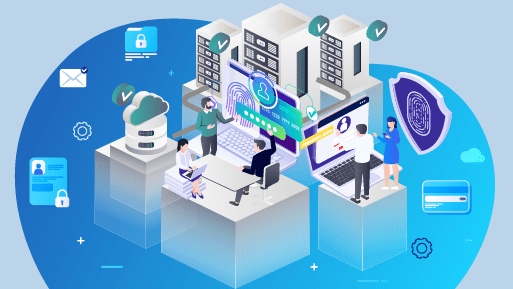Fintech, short for ‘financial technology, is the application of new technological advancements to products and services in the financial industry. The Fintech industry is rapidly evolving, driven in part by the adoption of new technologies such as artificial intelligence and blockchain-powered assets. Currently, the Fintech market is projected to reach $190 billion by 2026, growing annually by 13.7%. With the advancement of the industry, so is there a growing cybersecurity concern among businesses.
Today, the industry is facing a huge spike in attacks like data breaches and compromise of sensitive information. Fintech companies in particular should be vigilant as they are the gatekeepers of customer’s financial information. All that a hacker needs for a successful attack is, to find a single vulnerability to exploit and cause harm to your reputation or even permanent closure. All Fintech organizations share similar cybersecurity challenges, so it is important to implement best practices to prevent potential attacks.
Why is Cybersecurity Important in the Fintech Industry?
Financial service providers have been targeted the most by criminals for the last several years. In comparison to traditional banking, Fintech firms do not have to adhere to meticulous regulations, and will often only partially secure their solutions, or fail to implement some measures altogether. Functional, yet poorly secured products, are likely to lead to security costs, making Fintech startups more of a risk than traditional banking methods.
Proactive cybersecurity solutions including technical security assessments like penetration testing facilitate Fintech businesses to decrease their risk in the digital world. Email is a pivotal tool in financial services, used for authentication purposes, transaction notifications, marketing, and other customer communications. Without proper email security protocols in place, customer loyalty, product credibility and services are at stake. For these reasons having a cybersecurity program in place with all the necessary measures and policies in place is essential for businesses in the Fintech industry.
Cybersecurity Audit or Assessment
A cybersecurity audit helps keep a check on the effectiveness of cybersecurity controls in place. Cyber risk is not inherently mitigated just because control is present. For instance, having a firewall in place might meet the requirement, but if they are misconfigured, the controls may not be effective and rather result in exploitation and breach Organizations must insist on conducting an assessment of their systems, processes, and operations. The assessment will evaluate the effectiveness of their cybersecurity program and examine the current technology, documentation, and network configuration. This is crucial to ensure that necessary measures in place are valid and effective against any potential cyber risk.
Fintech Cybersecurity Tips
Cybersecurity within the fintech industry is a necessity, and failing to implement best practices invites risks to your business. Organizations should be mindful of basic principles such as the following:
- Know your assets and manage change effectively. Concluding which assets are the most valuable to your organization is the first part of implementing practices to promote growth without ever exposing the assets.
- Practice cybersecurity hygiene. Basic security measures should never be overlooked, such as regularly changing passwords and consistently performing security updates.
- Implement a defense-in-depth approach. This works to combine multiple security controls to monitor, detect, and combat cyber-attacks. A layered security structure ensures that if protection fails, other defenses will still operate smoothly.
- Educate employees and increase communication. With proper training of staff, and encouraged better communication, ensure they know exactly how to respond during an incident.
As technology continues to evolve, so have the techniques and methods of hackers to infiltrate systems against the fintech industry evolved. Implementing the above-mentioned tips will help improve cybersecurity for financial institutions and protect their data. Other than the above-mentioned techniques consider the following suggestion as well pertinent to cybersecurity.
Identity and Access Management
Tight security measures especially for system access can dramatically improve the organization’s cybersecurity posture. This is because cyberattacks can also happen from within an organization. So, one can restrict access to sensitive data and only allow those employees based on their roles and responsibilities. Fintech companies also tend to struggle with maintaining transparency about the system and network access. Relying on manual access management processes runs certain risks and takes up your time.
However, your business can combat this by integrating effective measures of an Identity and Access Management system that keeps your business secure. An example of this is AI technology used for online document verification that eliminates illegitimate documents and prevents unauthorized access and fraudulent activities.
Secure the Cloud
Many fintech applications run on the cloud, something that is both an opportunity and a risk for businesses. The benefit is that you can deliver hassle-free services to customers, but the drawback is the exposure of data and security to a cyberattack. So, implementing a robust cloud security strategy ensures necessary protection that keeps your company and customers safe. Securing the cloud fortifies your business against current and emerging threats.
Bottom Line
Cybersecurity is a concern for modern businesses, especially among Fintech companies. The Fintech industry is growing rapidly, and it is essential to implement best practices to protect against any attacks or cyber risks. Fintech companies cannot afford to have security risks, as they are responsible for the financial information of customers.
So, they should be particularly cautious and take necessary measures to ensure maximum safety. Considering the above-mentioned tips and techniques of security is one-way Fintech companies can kick-start their process of securing their business systems and operations.

